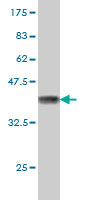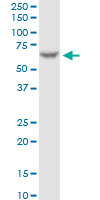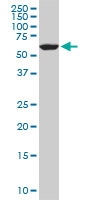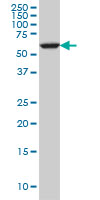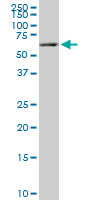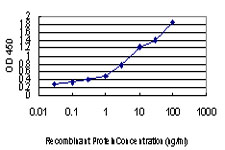FAAH Antibody (monoclonal) (M07)
Mouse monoclonal antibody raised against a partial recombinant FAAH.
- SPECIFICATION
- CITATIONS: 1
- PROTOCOLS
- BACKGROUND

Application
| WB, E |
|---|---|
| Primary Accession | O00519 |
| Other Accession | NM_001441 |
| Reactivity | Human, Mouse, Rat |
| Host | mouse |
| Clonality | Monoclonal |
| Isotype | IgG2a Kappa |
| Clone Names | 4H8 |
| Calculated MW | 63066 Da |
| Gene ID | 2166 |
|---|---|
| Other Names | Fatty-acid amide hydrolase 1, Anandamide amidohydrolase 1, Oleamide hydrolase 1, FAAH, FAAH1 |
| Target/Specificity | FAAH (NP_001432, 480 a.a. ~ 579 a.a) partial recombinant protein with GST tag. MW of the GST tag alone is 26 KDa. |
| Dilution | WB~~1:500~1000 E~~N/A |
| Format | Clear, colorless solution in phosphate buffered saline, pH 7.2 . |
| Storage | Store at -20°C or lower. Aliquot to avoid repeated freezing and thawing. |
| Precautions | FAAH Antibody (monoclonal) (M07) is for research use only and not for use in diagnostic or therapeutic procedures. |

Provided below are standard protocols that you may find useful for product applications.
Background
This gene encodes a protein that is responsible for the hydrolysis of a number of primary and secondary fatty acid amides, including the neuromodulatory compounds anandamide and oleamide.
References
1.Dysfunction in Fatty Acid amide hydrolase is associated with depressive-like behavior in wistar kyoto rats.Vinod KY, Xie S, Psychoyos D, Hungund BL, Cooper TB, Tejani-Butt SM.PLoS One. 2012;7(5):e36743. Epub 2012 May 14.2.Selective alterations of the CB1 receptors and the fatty acid amide hydrolase in the ventral striatum of alcoholics and suicides.Vinod KY, Kassir SA, Hungund BL, Cooper TB, Mann JJ, Arango V.J Psychiatr Res. 2009 Dec 14. [Epub ahead of print]3.RNAi-Mediated Knockdown of Dynamin 2 Reduces Endocannabinoid Uptake Into Neuronal dCAD Cells.McFarland MJ, Bardell TK, Yates ML, Placzek EA, Barker E.Mol Pharmacol. 2008 Jul;74(1):101-8. Epub 2008 Apr 24.
If you have used an Abcepta product and would like to share how it has performed, please click on the "Submit Review" button and provide the requested information. Our staff will examine and post your review and contact you if needed.
If you have any additional inquiries please email technical services at tech@abcepta.com.














 Foundational characteristics of cancer include proliferation, angiogenesis, migration, evasion of apoptosis, and cellular immortality. Find key markers for these cellular processes and antibodies to detect them.
Foundational characteristics of cancer include proliferation, angiogenesis, migration, evasion of apoptosis, and cellular immortality. Find key markers for these cellular processes and antibodies to detect them. The SUMOplot™ Analysis Program predicts and scores sumoylation sites in your protein. SUMOylation is a post-translational modification involved in various cellular processes, such as nuclear-cytosolic transport, transcriptional regulation, apoptosis, protein stability, response to stress, and progression through the cell cycle.
The SUMOplot™ Analysis Program predicts and scores sumoylation sites in your protein. SUMOylation is a post-translational modification involved in various cellular processes, such as nuclear-cytosolic transport, transcriptional regulation, apoptosis, protein stability, response to stress, and progression through the cell cycle. The Autophagy Receptor Motif Plotter predicts and scores autophagy receptor binding sites in your protein. Identifying proteins connected to this pathway is critical to understanding the role of autophagy in physiological as well as pathological processes such as development, differentiation, neurodegenerative diseases, stress, infection, and cancer.
The Autophagy Receptor Motif Plotter predicts and scores autophagy receptor binding sites in your protein. Identifying proteins connected to this pathway is critical to understanding the role of autophagy in physiological as well as pathological processes such as development, differentiation, neurodegenerative diseases, stress, infection, and cancer.
